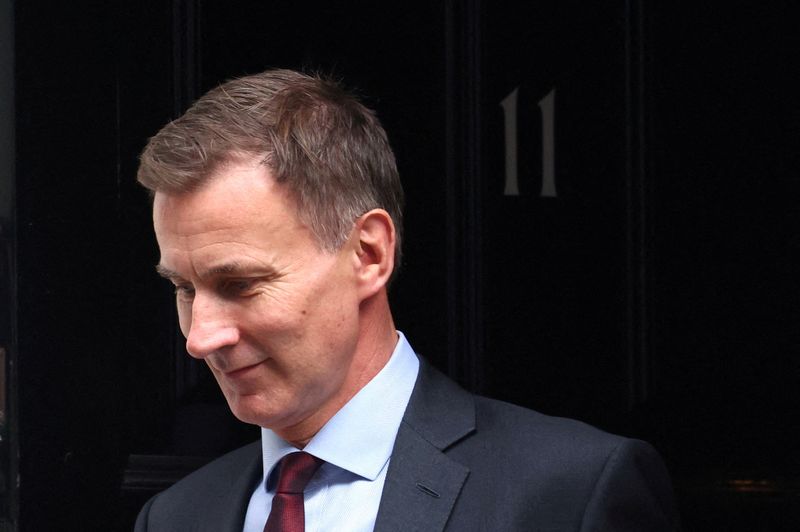By Kylie MacLellan and Andy Bruce
LONDON (Reuters) -British finance minister Jeremy Hunt said on Sunday he would not implement tax cuts that would push up inflation, days before he announces a major budget update that is widely expected to contain reductions in some taxes.
Hunt is due to present an Autumn Statement on Wednesday which he hopes will revive the fortunes of both a stagnant British economy and the governing Conservatives ahead of an election expected next year, and the Sunday Times reported he was considering cutting income tax or national insurance.
He has been under pressure from some Conservative lawmakers who, alarmed at the opposition Labour Party's big lead in opinion polls, have demanded he deliver tax cuts.
"We do want to bring down the tax burden but we will only do so responsibly," Hunt told Sky News. "The one thing we won't do is any kind of tax cut that fuels inflation."
Annual inflation tumbled to 4.6% in October from 6.7% a month earlier, putting Prime Minister Rishi Sunak on track to meet a pledge of halving inflation over 2023.
"I do think the British economy has turned a corner this week," Hunt said in a separate interview with Times Radio, adding that his priority was growth. "I will be doing everything that I can possibly think of to boost growth."
Asked if he would cut inheritance tax - a move the Sunday Times said could be delayed owing to bad press - Hunt told Sky "everything is on the table" ahead of his statement.
OPTIONS LIMITED AFTER HEAVY SPENDING
Labour's finance spokesperson Rachel Reeves said cutting inheritance tax would be the wrong priority in a cost-of-living crisis.
"Lower taxes on working people - if the government can explain where the money is coming from - is something I would support," Reeves told Sky News.
Hunt's options are limited after heavy state spending on the COVID-19 pandemic and last year's surge in energy prices. Public debt now stands close to 100% of economic output, more than three times its size 20 years ago.
Still, official forecasts due on Wednesday are expected to show Hunt has more room for giveaways before running into trouble with fiscal rules than in his annual budget published in March.
"If we're going to be a dynamic, thriving, energetic, fizzing economy, we need to have a lower tax burden," Hunt told Times Radio, adding that the only way to bring personal taxes down was to spend public money more efficiently.
"We want to show people there is a path to lower taxes but we also want to be honest with people this is not going to happen overnight."
While UK tax revenues are at their highest since the 1940s, according to the Institute for Fiscal Studies, the country's tax rate is lower than in most other western European countries. Data for 2021 from the Organisation for Economic Co-operation and Development showed Britain was the lowest among major European countries, well below France's 45% or Germany's 40%.
